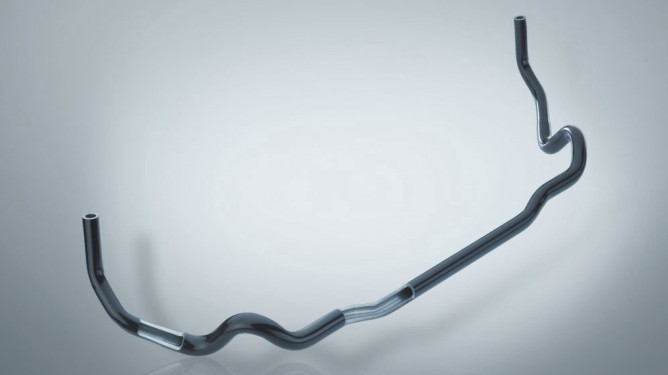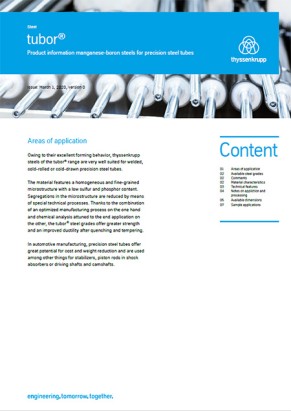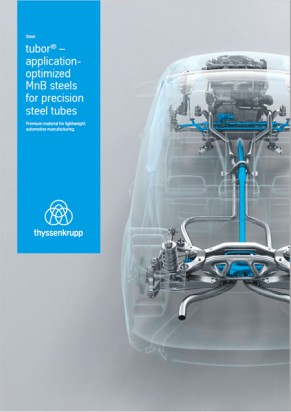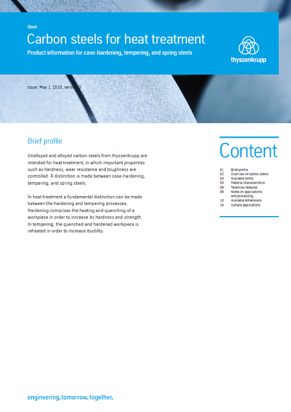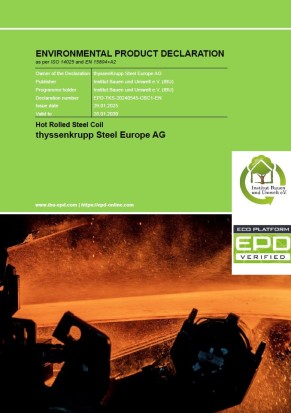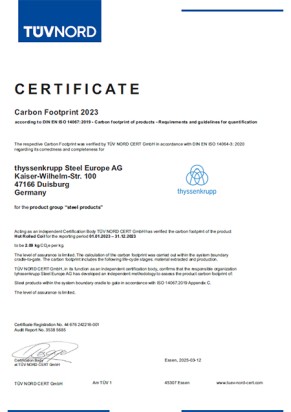Premium material for lightweight automotive manufacturing: tubor® – our application-optimized MnB steel for the production of precision steel tubes

Owing to their excellent forming behavior, steels of the tubor® range are very well suited for welded, cold-rolled or cold-drawn precision steel tubes. The material features a homogeneous and fine-grained microstructure with a low sulfur and phosphor content. Segregations in the microstructure are significantly reduced by means of special technical processes. Thanks to the combination of an optimized manufacturing process on the one hand and chemical analysis attuned to the end application on the other, the tubor® steel grades offer greater strength and a improved ductility after quenching and tempering.
Application examples of precision steel tubes made of MnB steels
In automotive manufacturing, precision steel tubes offer great potential for cost and weight reduction and are used among other things for stabilizers, piston rods in shock absorbers or driving shafts and camshafts.
thyssenkrupp supplies the steel grades as per the product information or the reference steel grades in accordance with the respective standards.
tubor® – special MnB steels for precision steel tubes
| Steel grade designation |
Standard designation1 |
THICKNESS2 from _ to in mm |
WIDTH2 max. mm |
|---|---|---|---|
| tubor® 26 | 26MnB5 | 1.95 – 13.00 | 2,030 |
| tubor® 34 | 34MnB5 | 1.75 – 18.00 | 1,630 |
| tubor® 45 | 44MnB5 | 4.00 – 8.00 | 1,600 |
Chemical composition
| Steel grade |
C [%] |
Si [%] |
Mn [%] |
P [%] max. |
S [%] max. |
Al [%] |
Cr [%] |
Ti [%] |
Nb [%] |
B [ppm] |
|---|---|---|---|---|---|---|---|---|---|---|
| tubor® 26 | 0.23 – 0.27 | 0.15 – 0.35 | 1.15 – 1.40 | 0.020 | 0.006 | 0.015 – 0.055 | 0.05 – 0.20 | 0.015 – 0.045 | – | 15 – 40 |
| tubor® 34 | 0.33 – 0.37 | 0.15 – 0.35 | 1.15 – 1.40 | 0.020 | 0.006 | 0.015 – 0.055 | 0.05 – 0.20 | 0.020 – 0.050 | – | 15 – 40 |
| tubor® 45 | 0.42 – 0.48 | 0.15 – 0.35 | 1.00 – 1.40 | 0.020 | 0.006 | 0.065 – 0.105 | 0.25 – 0.45 | 0.005 – 0.020 | 0.015 – 0.035 | 15 – 40 |
MnB steel according to DIN EN ISO 683-2 (previously DIN EN 10083-3)
| Steel grade designation |
Reference grade |
Material no. |
THICKNESS1 from _ to in mm |
WIDTH1 from _ to in mm |
|---|---|---|---|---|
| 20MnB5 | 20MnB5 | 1.5530 | 2.00 – 13.00 | 70 – 1,630 |
| 30MnB5 | 30MnB5 | 1.5531 | 2.00 – 13.00 | 70 – 1,630 |
| 39MnB5 | 389MnB5 | 1.5532 | 2.00 – 13.00 | 70 – 1,630 |
| 27MnCrB5-2 | 27MnCrB5-2 | 1.7182 | 2.00 – 13.00 | 70 – 1,630 |
| 33MnCrB5-2 | 33MnCrB5-2 | 1.7185 | 2.00 – 13.00 | 70 – 1,630 |
| 39MnCrB6-2 | 39MnCrB6-2 | 1.7189 | 2.00 – 13.00 | 70 – 1,630 |
Chemical composition
| Steel grade |
C [%] |
Si [%] max. |
Mn [%] |
P [%] max. |
S [%] max. |
Cr [%] |
Mo [%] max. / - |
B [ppm] |
|---|---|---|---|---|---|---|---|---|
| 20MnB5 | 0.17 – 0.23 | 0.40 | 1.10 – 1.40 | 0.025 | 0.010 | – | 0.10 | 8 – 50 |
| 30MnB5 | 0.27 – 0.33 | 0.40 | 1.10 – 1.45 | 0.025 | 0.010 | - | 0.10 | 8 – 50 |
| 39MnB5 | 0.36 – 0.42 | 0.40 | 1.15 – 1.45 | 0.025 | 0.010 | - | 0.10 | 8 – 50 |
| 27MnCrB5-2 | 0.24 – 0.30 | 0.40 | 1.10 – 1.40 | 0.025 | 0.010 | 0.30 – 0.60 | 0.10 | 8 – 50 |
| 33MnCrB5-2 | 0.30 – 0.36 | 0.40 | 1.20 – 1.50 | 0.025 | 0.010 | 0.30 – 0.60 | 0.10 | 8 – 50 |
| 39MnCrB6-2 | 0.36 – 0.42 | 0.40 | 1.40 – 1.70 | 0.025 | 0.010 | 0.30 – 0.60 | 0.10 | 8 – 50 |
tubor® steels in use: Perfection through precision

Vincenz Wiederholt is a German company with a tradition stretching back over many years. It manufactures precision steel tubes that can be found in almost every European car, and are also key components for general engineering and the agricultural industry. Most of the input stock for the high-end precision steel tubes is supplied by thyssenkrupp Steel.
The premises for precision tube manufacturing at Vincenz Wiederholt are certainly impressive to behold: at the company's headquarters in Holzwickede, silver tubes are neatly stacked and waiting to be shipped to customers. The tubes shimmer and reflect the sun's rays almost like a vast kaleidoscope, depending on how the light strikes them.
The company processes more than 70,000 metric tons of steel annually, providing a versatile range of structural elements to industrial customers predominantly in the automotive industry. Around 80 percent of the products are used in the form of tubes, sections and components in automotive systems. These include, for example, shock absorbers, cylinder tubes, tubes for tanks or even camshafts. The manufacturing process is far more complex than the layperson might think.
Quality combined with responsibility
During production, many parameters have to be coordinated with one another. At Vincenz Wiederholt, the manufacturing process from steel to the finished tube takes place in stages. Hardenable MnB steels from thyssenkrupp Steel serve as one of the basic materials. They are characterized by high strength, as well as homogeneity of mechanical properties after quenching and tempering.

Degree of purity of paramount importance
The hot-rolled wide strip supplied by thyssenkrupp Steel and cut into strips at service centers is welded into tubes at Vincenz Wiederholt. After annealing and chemical preparation, the tubular blank is threaded into a draw bench and then pulled through a die over a mandrel to reduce the outside diameter and wall thickness. The process optimizes the geometrical tolerance of the tube. The drawing process gives the inner surface of the finished tube particularly smooth surface properties. These are required, for example, for further processing into hydraulic cylinders for agricultural machinery. This is also ensured by the tubor® 26 and tubor® 34 steels supplied by thyssenkrupp Steel.
Only after completion can the tubes be checked for cleanliness and defects by eddy-current and ultrasonic testing. Any defects detected are costly, because all of the value added at Vincenz Wiederholt has already been incorporated into this tube.
Homogeneous and fine-grained
As a result, it is all the more important for the input stock from Duisburg to be of very high quality. Especially when the tube has to be annealed, the degree of purity of the steel is very important due to the underlying chemical analysis. "Manganese-boron steels are prone to an effect called segregation.
Hasan Bagci is pleased that the tubor® steels meet the complex requirements of one of the leading precision tube manufacturers.
